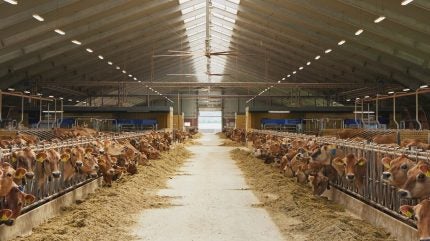
Denmark is looking to introduce the world’s first tax on carbon emissions from livestock farming, the country’s government has confirmed.
From 2030, farmers will be charged DKr300 ($43) per ton of carbon dioxide produced per year. In 2035, this will go up to DKr750 per ton of CO2 released.

Discover B2B Marketing That Performs
Combine business intelligence and editorial excellence to reach engaged professionals across 36 leading media platforms.
A 60% tax deduction, however, means farmers effectively pay DKr 120 per ton of CO2 emitted and DKr300 five years later.
To support the move, the government will also offer around Dkr40bn in subsidies.
The tax proposals were agreed by seven negotiation parties yesterday evening (25 June). These included the Danish Society for Nature Preservation, the Council of Food & Agriculture, Danish Metal Workers’ Union, the farm workers’ union NNF, Local Government Denmark and the Confederation of Danish Industry.
Denmark’s government has been assessing a possible farming emissions tax since February.

US Tariffs are shifting - will you react or anticipate?
Don’t let policy changes catch you off guard. Stay proactive with real-time data and expert analysis.
By GlobalDataThe implementation of the plans is contingent on approval from the national parliament, which is expected occur in August.
If approved, the carbon tax is predicted to cut Denmark’s greenhouse gas emissions by 1.8m tonnes of CO2 in 2030. This in turn, the government says, will help it move closer to its 2030 target of slashing emissions by 70% compared to a 1990 baseline.
In a statement, Jacob Jensen, the country’s Minister for Food, Agriculture and Fisheries, said the country was “writing a new chapter in Danish agricultural history” with the latest agreement.
He added: “Denmark is a proud food-producing nation, where we have some of the world’s most skilled farmers, for whom we now ensure a stable framework to continue producing world-class food for many years into the future.
“With the agreement, we create growth and jobs throughout the country, while taking good care of our climate, environment and nature. At the same time, we are investing in the young farmers of the future, who must carry on the torch and ensure continued development – and not winding down – of Danish food production.
“The world lacks food and climate solutions, and Danish agriculture can contribute to both parts, helped by this agreement.”
Nicolai Wammen, the country’s Finance Minister, said: “Today is truly historic for Denmark. For the climate, for our nature and for Danish agriculture. We are investing in the future of our agricultural sector, initiating a transition with shared ambitions and goals – laying the tracks to what our country will look like in five, ten and 20 years from now.
“We know that a CO2 tax model aligned across all sectors gives us the lowest societal costs in total. What we have now done from industry sectors to agriculture shows us that an ambitious green transition is possible.”
Mark Howden, director of the Institute for Climate, Energy and Disaster Solutions, Australian National University and a member of the Expert Panel on Livestock Methane added the move should act as an example for other nations to follow.
“The world can no longer afford to ignore the third of global emissions produced by the agri-food sector”, he said.
“The solutions needed to make a significant cut in agriculture’s climate footprint already exist – but financial incentives like the Danish tax could assist them being implemented at scale.
“This policy package looks like it can push down on greenhouse gas emissions efficiently at the same time as generating benefits for farmers and for biodiversity. Recirculating the proceeds of the tax into a transition support fund for the farm sector, if handled strategically with an appropriate research and development component, could generate a new wave of innovation and new opportunities.”
New Zealand also presented a plan to charge agricultural farmers for their greenhouse gas emissions in 2022.
The proposal, which looked to reduce methane and nitrous oxide emissions, received heavy criticism at the time from the national farmers’ federation, Federated Farmers of New Zealand.
Reports earlier this month indicated the centre-right coalition government, elected last November, intended to scrap such plans.





